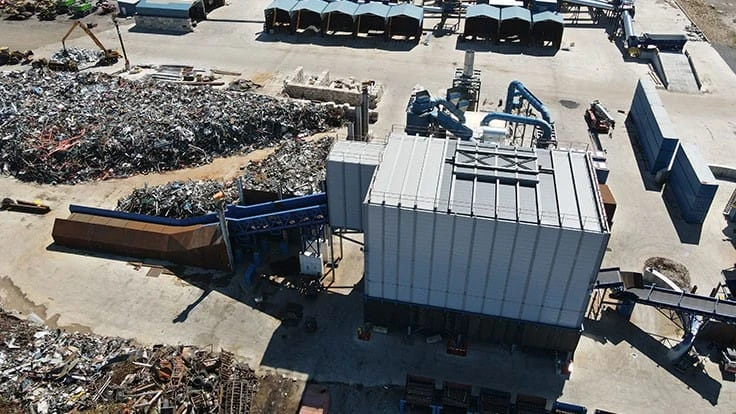
Photo courtesy of Southside Recycling/Reserve Management Group
The city of Chicago has denied Southside Recycling its final permit—the large recycling facility (LRF) permit—thereby preventing the company from operating. In response, the company says it will challenge the decision using all available channels.
The LRF applies to just a few businesses that meet certain thresholds for the volume of material handled, and the rules governing it were released in June of 2020. Southside Recycling was the first company to apply for an LRF permit under these new rules.
Southside Recycling submitted its permit application in November 2020. Shortly before doing so, the company says, it had received promises from city officials that its permit would be issued by year-end. Following a public hearing on the application and a request for additional information from the Chicago Department of Public Health (CDPH), the company submitted a revised application in mid-January 2021. The city assured the company that its application was complete and sufficient, Hal Tolin, RMG chief operating officer, previously told Recycling Today.
The decision to deny the LRF permit was reached following an analysis that the U.S. Environmental Protection Agency (EPA) recommended to assess the environmental justice implications and potential environmental and health effects of the proposed facility. The CDPH conducted the analysis.
In May 2021, EPA Administrator Michael S. Regan sent a letter to Mayor Lightfoot suggesting that the city complete an environmental justice analysis, such as a health impact assessment (HIA), prior to making a decision on the permit for the Southside Recycling facility. The city of Chicago then announced that the permit review for the site would be suspended until the city could complete a HIA.
Since then, the EPA says it has provided Chicago with technical assistance and support, including an air quality analysis and advice on conducting a HIA.
“The potential addition of another polluter in this overburdened and underserved community raised significant environmental justice and civil rights concerns,” Regan says. “I applaud Mayor Lightfoot for listening to those concerns and acting to protect the health of the residents. This is what environmental justice looks like: All levels of government working together to protect vulnerable communities from pollution in their backyards. As we did in Chicago, EPA stands ready to work hand in hand with local and state partners to fix environmental wrongs and achieve shared goals of protecting all people from pollution.”
The parent company of Southside Recycling, Reserve Management Group (RMG), headquartered in Stow, Ohio, says the site is designed to be the most advanced automobile shredding facility in the country. It features a European-style shredder enclosure to better contain noise and emissions. The shredder incorporates a regenerative thermal oxidizer and wet scrubber to address the release of volatile organic compounds (VOCs). It also features a suction hood and high-efficiency filters to capture metals and particulate matter. The Southside Recycling operation even features an on-site wastewater treatment plant.
In response to the decision, RMG issued a statement:
“We have built the most environmentally conscious metal recycling facility in the country, but politicians and government officials have ignored the facts and instead were cowed by persistent false narratives and misinformation aimed at demonizing our business. What should have been an apolitical permitting process was hijacked by a small but vocal opposition that long ago made clear they would unconditionally oppose this facility, facts and science be damned. Politics, not environmental or public health protection, is the only reason that the city denied Southside Recycling’s permit to operate.
“Experts repeatedly determined that Southside Recycling would not threaten public health or environmental justice efforts. When the Illinois EPA completed its exhaustive review process and issued our state air permit in June 2020, its efforts were lauded by career professionals at the U.S. EPA for taking a rigorous approach to community engagement and environmental justice considerations. And the city’s own health experts, using intentionally inflated parameters to overstate the effects of the operation, still concluded that the facility poses no risk of adverse health effects above the benchmarks defined by the U.S. EPA.
“We will continue to pursue all avenues to challenge this decision, including pressing our lawsuit against the city, which will likely result in taxpayers being on the hook for hundreds of millions of dollars in damages. Aside from the litigation, this decision is a clear message to any businesses or industries that might be considering expansion or investment in Chicago: the city is not a reliable partner and is not open for business. Chicago has loudly stated that politics—not signed agreements, its own laws and regulations, nor actual protection of human health and the environment—is the ultimate consideration in all matters.”
Get curated news on YOUR industry.
Enter your email to receive our newsletters.Latest from Recycling Today
- ReMA opposes European efforts seeking export restrictions for recyclables
- Fresh Perspective: Raj Bagaria
- Saica announces plans for second US site
- Update: Novelis produces first aluminum coil made fully from recycled end-of-life automotive scrap
- Aimplas doubles online course offerings
- Radius to be acquired by Toyota subsidiary
- Algoma EAF to start in April
- Erema sees strong demand for high-volume PET systems






